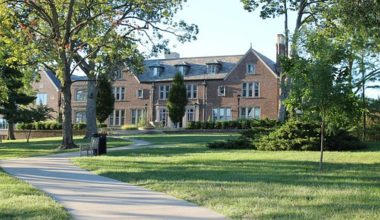Start your educational journey in the UK. happy news The University of Bristol is offering a Think Big Scholarship right now. We will go into great detail regarding this scholarship in this article, along with its advantages and step-by-step instructions for applying.
International students may apply for think big scholarships at the University of Bristol in 2023–2024. This scholarship offers the applicant up to £20,000 in fee exemptions toward the cost of tuition and is eligible for undergraduate and master’s degrees.
Collaboration. It is what transforms ground-breaking research into outcomes that change the world. That is why we are collaborating with our partners in more than 40 nations to improve health, reduce poverty, be prepared for natural disasters, understand the effects of migration and war, promote technological advancement, and much more.
APPLY ALSO: Scholarships For International Students At Douglas College 2023
Scholarship Of The Summary
- Level of Study: Undergraduate, Masters
- Institution: University of Bristol
- Study in: UK
- Courses Offered:
— Any full-time Undergraduate program (except Medicine, Dentistry and Veterinary Science)
— Any one-year, full-time taught postgraduate program offered at the University - Program Period: Depends on the selected program
- Deadline: (Postgraduate: 24 April 2023) / (Undergraduate: 27 February 2023). (annual)
Scholarship Coverage
University of Bristol Think Big Scholarship provides the recipients with the following awards:
- Undergraduate Students for September 2022 entry:
- 3 x £10,000 scholarships
- 9 x £5,000 scholarships
- Postgraduate students for September 2022 entry:
- 5 x £20,000 scholarships
- 10 x £10,000 scholarships
- 20 x £5,000 scholarships
- The awards can only be used as fee waivers towards the cost of tuition fees.
University of Bristol Think Big Scholarship Requirements
You must meet the following requirements in order to be eligible for the University of Bristol Think Big Scholarship:
- English is a required language.
- All nations in the world are eligible.
- For the purposes of fees, you are categorized as an international student.
- You have applied to the University of Bristol to begin a full-time undergraduate degree program in one of the prerequisite courses or a one-year or full-time taught postgraduate program in September 2022.
- Not already be receiving any other financial aid that would cover the full cost of tuition in addition to the Bristol scholarship.
How to Apply for University of Bristol Think Big Scholarship?
Please follow the following application instructions to apply for this scholarship:
- Apply for the university through UCAS as you will need your ID student.
- Submit an application for the Think Big Scholarship.
Note: This application form is a standard form used for several different scholarships, We will automatically check your eligibility for other available scholarships.
APPLICATION WEBSITES
To know more about University of Bristol Think Big Scholarship, please visit official websites:
- For Undergraduate: Click Here
- For Masters: Click Here
History Of The University
University College, Bristol existed prior to the University of Bristol.
The University of Bristol’s predecessor, University College, Bristol, lasted from 1876 to 1909.
Its beginnings can be seen in John Percival’s efforts to push for the creation of such a facility while serving as the headmaster of Clifton College. Percival noted in a letter to the Oxford colleges in 1872 that there was no university culture in the provinces. He published a paper the next year titled “The Connection of the Universities and the Great Towns,” which Benjamin Jowett, Master of Balliol College, Oxford, praised. Jowett would play a crucial role in the founding of University College, Bristol, both intellectually and financially.
At Bristol’s Victoria Rooms, a gathering was held in June 1874 “to establish a School of Science and Literature for the West of England.” Speaking at the conference, Percival and Jowett gained the support of Albert and Lewis Fry, two prominent and wealthy locals.
On Tuesday, October 10, 1876, at 9 am, University College, Bristol finally opened its doors in rented space at 32 Park Row. At first, 15 subjects were covered by two professors and five lecturers. Men and women could enroll at the college on the same terms (except in medicine). In the first session, 238 nighttime students and 99 day students (30 men and 69 women) registered (143 men and 95 women).
Up until 1881, Alfred Marshall, a pioneering economist, was the College’s principal. His wife, Mary Paley, the first woman professor, taught during the day while he taught sessions in the evening. Her husband’s pay was reduced to cover her charge. William Ramsay, who discovered the so-called noble gases, served as the second Principal.
He left in 1887 (and won the Nobel Prize for Chemistry in 1904) but continued to play a significant role in the College’s efforts to become an institution of higher learning with a Royal Charter. Conwy Lloyd Morgan, a geologist and naturalist who later made a name for himself as an experimental psychologist, succeeded him. He was also a key player in the push for full university status and would go on to become the first Vice-Chancellor of the University of Bristol.
While University College, Bristol, struggled financially, the local Technical Instruction Committee gave it a £2,000 boost in 1890. More good news came in 1893 with the official incorporation of the 1833-founded Bristol Medical School into the College. Further encouragement came in 1896, when Treasury Commissioners noted that “the work done is of the university type” and that “there is definitely vigorous life in the institution.” Another very important development was the University College Colston Society’s founding in 1899, which attracted a wide range of powerful people to support the College.
Morris Travers’ hiring as a professor of chemistry in 1904 gave the Charter movement a boost. Travers, a driven and determined individual who had been suggested for the position by former Principal William Ramsay, set out to secure the financial and political backing for Bristol’s objectives. Lewis Fry, the head of the college council, R B (later Lord) Haldane, and members of the Wills family were among the influential people who supported him.
Lewis Fry decided to formally establish the proposal to support a university for Bristol in 1906, and an executive committee was established. However, issues persisted. Travers left that year to lead a research institute in India, and it was very challenging to increase the College’s endowment above the £30,000 given by members of the Wills and Fry families.
Everything changed on January 14, 1908, when HO Wills pledged a substantial donation of £100,000 if a Charter was given within two years. The Wills gift started a domino effect, and within 24 hours, more money was raised than had been brought in during the previous three decades.
Now, things started to move quickly. After much deliberation, it was decided to unite the Merchant Venturers’ College with some portions of the University College, two institutions that were once rivals, to create a new Faculty of Engineering. Additionally, subject to a Charter being gained, the City Council provided the earnings of a penny rate (about £7,000 annually). The Privy Council received royal approval when a petition for a Charter was presented to it, which is the best part.
33 years after University College’s founding, on May 24, 1909, the King Edward VII-approved Charter went into effect. Bristol residents were celebrating that day.






